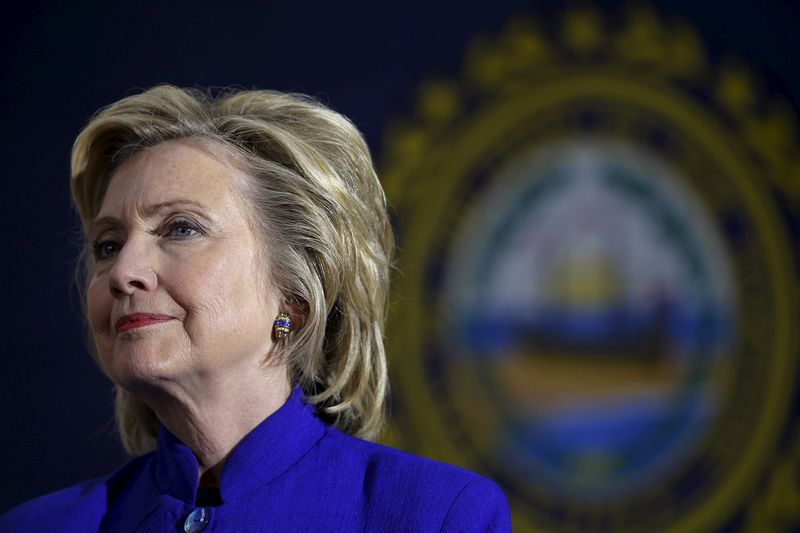By Jonathan Allen
NEW YORK (Reuters) - Democratic presidential candidate Hillary Clinton is giving the U.S. Justice Department her private email server and a thumb drive of work-related emails from her tenure as secretary of state, a spokesman for her campaign said on Tuesday.
Clinton's use of her private email for her work as America's top diplomat came to light in March and drew fire from political opponents who accused her of sidestepping transparency and record-keeping laws.
The private account was linked to a server in her New York home. For months, Republican lawmakers have demanded that Clinton relinquish the server for inspection by an independent party, which Clinton said she was not willing to do. Some of those lawmakers quickly began issuing statements on Tuesday night, saying their concerns were vindicated as not being motivated only by politics.
The Justice Department and the Federal Bureau of Investigation both declined to comment.
The FBI recently began looking into the security of the federal records and classified information contained among Clinton's emails. The U.S. government considers federal records to be government property.
The Justice Department has said the FBI began investigating after the inspector general who oversees the U.S. intelligence agencies, I. Charles McCullough III, formally notified them of his concern that there was classified information not in the government's control.
McCullough has said he found at least four emails in a sample of 40 Clinton emails he was allowed to inspect contained information that was classified at the time it was sent, including two that contained information deemed "top secret", the highest classification level. The government forbids the sending of classified information outside unsecured networks because it could harm national security if intercepted.
The statement from Nick Merrill, a Clinton campaign spokesman, suggested the hardware was being handed over as part of the FBI inquiry. It remained unclear whether this was in response to a government request, or even came as the result of a subpoena.
"She pledged to cooperate with the government's security inquiry, and if there are more questions, we will continue to address them," Merrill said in a statement. He declined to provide further details. David Kendall, Clinton's lawyer, did not respond to a request for comment.
The FBI has declined to give details about the nature of its investigation and who it might encompass, although it is likely to prove an unwelcome distraction for Clinton for months as she tries to keep voters focused on her policy proposals.
Throughout her four years as secretary of state under President Barack Obama, Clinton eschewed an official state.gov email address in favor of a private clintonemail.com email account run from a home computer server. At least one senior aide, Huma Abedin, also used the server for some work email.
Clinton said the unusual arrangement broke no rules that were in force at the time, although the arrangement has caused long delays in providing federal records to lawmakers and the public to which they are entitled, critics say.
Trey Gowdy, the Republican chair of a U.S. House of Representatives committee investigating the killing of four Americans at a U.S. diplomatic building in Benghazi, Libya, has said his work has been hampered in this way.
"This is a serious national security issue, and the seriousness of it should transcend normal, partisan politics," Gowdy said in a statement on Tuesday.
Last December, Clinton provided what she said were copies of all the work emails she had in her possession, nearly two years after she stepped down as secretary of state.
Clinton handed over about 30,000 emails she sent and received, although her staff have since acknowledged without explanation that some work emails are missing. She did not hand over another 30,000 emails from this period that she deemed personal and said she chose "not to keep".
The State Department has been steadily releasing the emails to the public in keeping with Clinton's request after redacting parts of them to remove sensitive or classified information.
A number of polls in recent months have found that more than half of voters find Clinton untrustworthy, although she remains the favorite to win the Democratic Party's nomination for the presidential election in November 2016.
The development was quickly seized by Clinton's Republican opponents as a chance to portray her not worthy of the White House.
"If Hillary Clinton believed in honesty and transparency, she would have turned over her secret server months ago to an independent arbiter, not as a last resort and to the Obama Justice Department," Reince Priebus, the chairman of the Republican National Committee, said in a statement.

Republican John Boehner, the U.S. House of Representatives speaker, also released a statement saying that Clinton's "mishandling of classified information must be fully investigated."